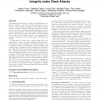Free Online Productivity Tools
i2Speak
i2Symbol
i2OCR
iTex2Img
iWeb2Print
iWeb2Shot
i2Type
iPdf2Split
iPdf2Merge
i2Bopomofo
i2Arabic
i2Style
i2Image
i2PDF
iLatex2Rtf
Sci2ools
CCS
2015
ACM
2015
ACM
Losing Control: On the Effectiveness of Control-Flow Integrity under Stack Attacks
Adversaries exploit memory corruption vulnerabilities to hijack a program’s control flow and gain arbitrary code execution. One promising mitigation, control-flow integrity (CFI), has been the subject of extensive research in the past decade. One of the core findings is that adversaries can construct Turing-complete code-reuse attacks against coarsegrained CFI policies because they admit control flows that are not part of the original program. This insight led the research community to focus on fine-grained CFI implementations. In this paper we show how to exploit heap-based vulnerabilities to control the stack contents including securitycritical values used to validate control-flow transfers. Our investigation shows that although program analysis and compiler-based mitigations reduce stack-based vulnerabilities, stack-based memory corruption remains an open problem. Using the Chromium web browser we demonstrate real-world attacks against various CFI implementations: 1) agains...
| Added | 17 Apr 2016 |
| Updated | 17 Apr 2016 |
| Type | Journal |
| Year | 2015 |
| Where | CCS |
| Authors | Mauro Conti, Stephen Crane, Lucas Davi, Michael Franz, Per Larsen, Marco Negro, Christopher Liebchen, Mohaned Qunaibit, Ahmad-Reza Sadeghi |
Comments (0)

